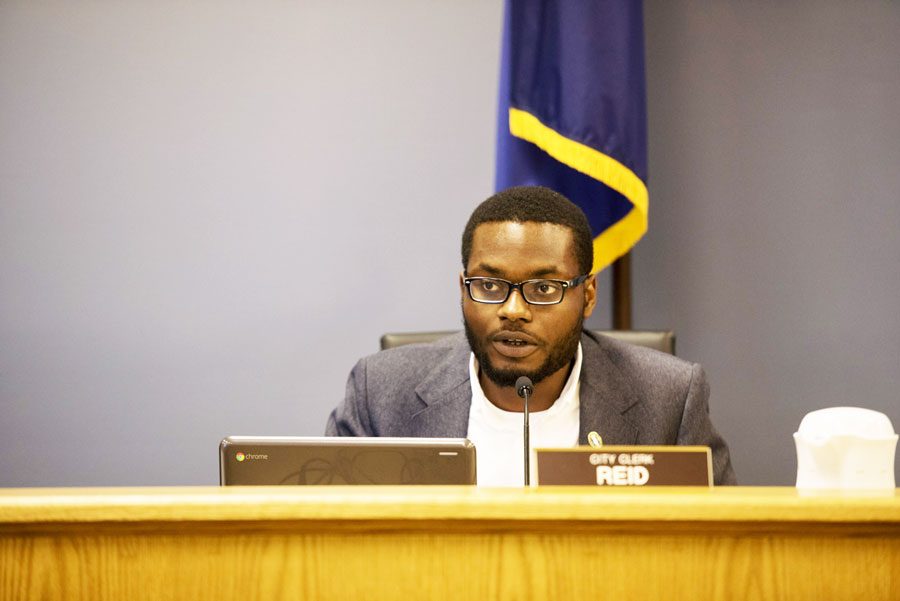Officer in charge of FOIA requests sues Evanston over access to information
Daily file photo by Katie Pach
Evanston city clerk Devon Reid. Reid filed a suit against the city over his access to FOIA information.
May 9, 2019
City clerk Devon Reid filed a suit Tuesday against the city regarding his access to information as a FOIA officer.
Reid was elected to his role as city clerk and FOIA officer two years ago and has been struggling to get unedited information from the city since, he told The Daily. The declaratory judgement complaint Reid filed is essentially asking the court to determine his rights in that role.
“So I see my role as the FOIA officer, and especially as one of the only elected FOIA officers in the state… is to make sure that we are fighting for the public’s interest at all times and to make sure that all public records are accessible to the public,” Reid said.
Reid’s lawyer, Ed Mullen, said the suit is asking the court to clarify the policy regarding Reid’s control of unredacted information and access to body camera and dash camera footage from the Evanston Police Department.
City attorney Michelle Masoncup said the city believes it is complying with the law.
“The City of Evanston operates within the statutory limitations established by the Illinois Body-Worn Camera Act and the Illinois Freedom of Information Act with respect to which individuals may review the body worn camera footage,” Masoncup said in a statement to Evanston Now.
EPD began employing body cameras in January 2018, and since assuming his role as city clerk, Reid said he has not been able to get copies of the footage. Mullen said when people submit a FOIA request to receive the footage, the city refuses to share that same footage with Reid.
Evanston Mayor Steve Hagerty suggested Reid shouldn’t be able to see the footage, saying that even he doesn’t see it.
“The way the state law is written, our belief is that the only person that sees this is the person putting it together from the police department, and the person requesting it, no one else,” Hagerty told The Daily.
Additionally, Mullen said Reid receives redacted documents from the city in instances where he should be the one to determine if information should be withheld or released to the public.
Reid said there have been occasions when FOIA exemptions have been applied incorrectly.
According to the suit, in instances where documents contain attorney-client communications, releasing that information unredacted does not waive Evanston’s privilege since Reid is an officer of the city.
“Reid believes that transparency and access to government information is extremely important especially is his role as city clerk,” Mullen said.
According to the suit, it was “standard practice” before Reid took office to automatically provide this footage to the acting FOIA officer. Mullen said the city’s interpretation of this statute has been determined based on its relationship with Reid.
“I’ve tried to handle it internally,” Reid said. “But at this point after two years of struggling to just make sure that I’m able to complete my statutory responsibility, I had to take this course of action.”
In 2016, the city created an online database that made all FOIA requests sent to the city visible to the public in an effort to increase transparency.
But after aldermen were made aware that the database publicly disclosed the names of juvenile offenders and survivors of sexual assault, they voted in 2017 to make the database private again. At the time, Ald. Donald Wilson (4th) said Reid was made aware of the issues but failed to take down any of the posts in question.
Reid responded by saying the posts were removed after reviewing the site. All FOIA requests made to the city are now again visible, though it is unclear when that happened.
Mullen said that these types of lawsuits are common and often the court is needed to “fill in the gaps” where public policy is unclear.
“Our trust bank is depleted and in order to build the reserves in that trust bank we have to admit when were wrong sometimes and we have to release things that could be damaging for us so folks know they can trust government,” Reid said.
The case will be heard in front of the Circuit Court of Cook County in September.
Andres Correa contributed reporting.
Email: [email protected]
Twitter: @juliaesparza10












